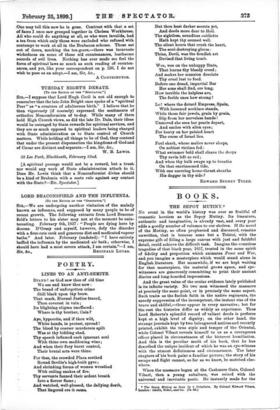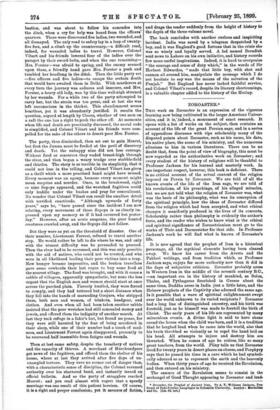BOOKS.
THE SEPOY MUTINY.*
No event in the world's history was ever so fruitful of romantic heroism as the Sepoy Mutiny. Its literature, authentic and imaginative, is already vast, and every year adds a goodly number of volumes to our shelves. If the novel of the Mutiny, so often prophesied and discussed, remains unwritten, that is because none but a Tolstoi, with the supreme gift of filling a large canvas with just and faithful detail, could achieve the difficult task. Imagine the countless tragedies of that black year, 1857, treated in the same spirit of fidelity and proportion which animates Peace and War, and you imagine a masterpiece which would stand alone in English literature. But meanwhile, if we are kept waiting for that masterpiece, the material grows apace, and eye- witnesses are generously committing to print their ancient diaries and long-hoarded impressions.
And the great value of the ocular evidence lately published is its infinite variety. No two men witnessed the massacre at precisely the same point, or in precisely the same aspect. Such traits as the foolish faith in the native regiments, the speedy suppression of the incompetent, the instant rise of the brave and skilful,—these appear in every narrative ; but for the rest the histories differ as widely as experience. Thus Lord Roberts's splendid record of valiant deeds is perforce kept at a high level of dignity; on the other hand, the strange journals kept by two beleaguered natives and recently printed, exhibit the true style and temper of the Oriental, while Colonel Vibart reveals himself to us as a courageous officer placed in circumstances of the bitterest humiliation. And this is the peculiar merit of his book, that he has described the unique incident of which he was an eye-witness with the utmost definiteness and circumstance. The later chapters of his book paint a familiar picture; the story of his escape and flight cannot, so far as we know, be matched else- where.
When the massacre began at the Cashmere Gate, Colonel Vibart, then a young subaltern, was seized with the universal and inevitable panic. He instantly made for the
• The &pay Mutiny as Seen by a Subaltern. By Colonel Edward Vibart, London : smith, Elder, and Co. 17s. CxL)
bastion, and was about to follow his comrades into the ditch, when a cry for help was heard from the officers' quarters. There were discovered five ladies, two wounded, and all dismayed. The only road to safety lay in a leap of twenty- five feet, and a climb up the connterscarp,—a difficult road, indeed, for wounded ladies to travel. However, Colonel Vibart and his friends lowered four of the ladies over the parapet by their sword-belts, and when the one remaining— Mrs. Forster—was afraid to spring, and the enemy seemed upon them, a friendly hand gave Mrs. Forster a push and tumbled her headlong in the ditch. Then the little party set —five officers and five ladies—to escape the certain death that would have awaited them in Delhi. With murderers at every turn the journey was arduous and insecure, and Mrs. Forster, a heavy old lady, was by this time well-nigh stunned by her wounds. For a while two of the party attempted to carry her, but the strain was too great, and at last she was left unconscious in the thicket. This abandonment seems heartless, yet it was abundantly justified. It recalls the question, argued at length by Cicero, whether of two men on a raft the one has a right to push the other off. At moments when life and death are practically discussed, the moral code is simplified, and Colonel Vibart and his friends were com- pelled for the sake of the others to desert poor Mrs. Forster.
The party, thus diminished, then set oat to gain Meerut, but first the Jumna must be forded at the peril of discovery and death. Yet the unhappy nine did not lose courage. Without food or resources they waded breast-high through the river, and then began a weary trudge over stubble-field and thistles. The story is so terrible in its simplicity, that it could not lose in the telling, and Colonel Vibart has given us a thrill which a more practised hand might have missed. Every moment was an agony, because every moment might mean surprise and murder. Once, in the brushwood, eight or nine Sepoys appeared, and the wretched fugitives could only huddle under the bushes and pray for concealment. No wonder that Colonel Vibart can recall the smallest detail with terrified exactitude. "Although upwards of forty years," says he, " have passed since the incident I am now relating, every movement of those Sepoys is as clearly im- pressed upon my memory as if it had occurred but yester- day." However, after an acute suspense, the poor hunted creatures crawled away, and the Sepoys did not follow.
But they were as yet on the threshold of disaster. One of their number, Lieutenant Forrest, refused to travel another step. He would rather be left to die where he was, and only with the utmost difficulty was he persuaded to proceed. Then the river had to be recrossed, and this was only possible with the aid of natives, who could not be trusted, and who were in all likelihood leading their poor victims into a trap. Now hunger became imperative, and the broken travellers gave some cowherds their last rupee to buy some food at the nearest village. The food was brought, and with it came a rabble of villagers, apparently sympathetic, but none the less urgent that the English men and women should start at once across the parched plain. Fiercely hustled, they were forced to comply, and they had tottered but a short distance when they fell into the hands of marauding Goojurs, who stripped them, both men and women, of trinkets, headgear, and clothes. And even when all had been taken another rabble insisted that the poor wretches had still concealed money and jewels, and offered them the indignity of another search. At last they took refuge in a fakir's hut, but found no peace, for they were still haunted by the fear of being murdered in their sleep, while one of their number had a touch of mad- ness, and Lieutenant Forrest again disappeared, presently to be recovered half insensible from fatigue and wounds.
Then at last came safety, despite the treachery of natives and the rapacity of thieves. A merchant of Hurchundpore got news of the fugitives, and offered them the shelter of his house, where at last they arrived after five days of un- exampled torture. They were no sooner out of danger than, with a characteristic sense of discipline, the Colonel resumed authority over his shattered band, and instantly issued an official bulletin. And so the party of stragglers reached Meerut; and you read almost with regret that a speedy marriage was one result of this patient heroism. Of course, it is a right and proper conclusion; yet it savours of fiction, and drags the reader suddenly from the height of history to the depth of the three-volume novel.
The book concludes with another curious and inspiriting incident. India was saved by a telegram despatched by a boy, and it was England's good fortune that in the crisis she was so wisely and loyally served. A lad named Brendish sent news to Lahore on his own initiative, and history records few more useful inspirations. Indeed, it is hard to overpraise " the courage and sense of duty which," in the words of Sir Herbert Edwardes, " made that little boy, with shot and cannon all around him, manipulate the message which I do not hesitate to say was the means of the salvation of the Punjab." But England has never lacked faithful service, and Colonel Vibart's record, despite its literary shortcomings, is a valuable chapter added to the history of the Mutiny.







































 Previous page
Previous page